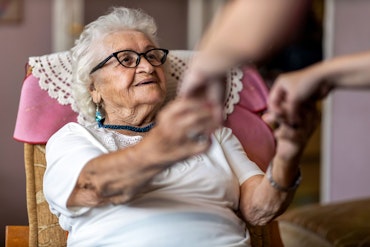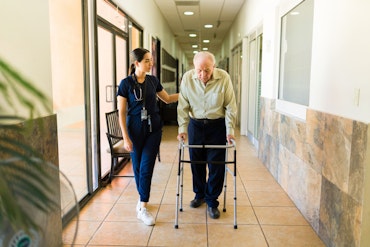Free Fitbit for eligible older Australians
Researchers at two Australian universities are seeking eligible study participants aged 65 years and older.
![<p>Increasing your weekly physical activity may have more benefits than only increasing your fitness level. [Source: Shutterstock]</p>](https://agedcareguide-assets.imgix.net/news/articles/wp/walkinggreen0107.jpg?fm=pjpg&format=auto&w=550&q=65)
Increasing your weekly physical activity may have more benefits than only increasing your fitness level. [Source: Shutterstock]
Key points:
- Approximately 60 percent of older Australians aren’t meeting the recommended daily guidelines for physical activity, according to the Australian Bureau of Statistics
- Older Australians in multiple South Australian suburbs are invited to check their eligibility for a new study called ‘Small Steps,’ assessing physical activity and dementia risk
- Researchers hope that this study will encourage older Australians to swap inactivity with interests that get their bodies moving
Two South Australian universities are looking for study participants to determine the impact of physical activity on brain health and dementia risk over 12 weeks.
The University of South Australia and Flinders University are collaborating with the City of Onkaparinga and ACH Group to study the impact of individualised programs on the physical activity of older Australians.
Only one-third of older Australians met the recommended guideline of 30 minutes of physical activity daily, according to the latest data from the Australian Bureau of Statistics.
Different types of physical activity fall into three categories, namely:
- moderate activity, e.g. brisk walking;
- vigorous activity, e.g. running;
- strength and toning, e.g. lifting weights or pilates.
Exercise ideas that vary in flexibility and intensity are available from the Department of Health and Ageing.
University of South Australia’s Associate Professor Ashleigh Smith is a healthy ageing expert and will be leading the ‘Small Steps’ study.
“The ‘Small Steps’ program aims to support behaviour change by allowing participants to adjust the activities they want to change while keeping those that they can not — or prefer not to change,” Associate Professor Smith said.
“Encouraging and supporting older adults to improve their lifestyles is our first goal, but beyond this, we’re hoping to see whether this may support improved thinking and memory skills,” she said.
Over 75 percent of Australians know that physical exercise and learning new things are good preventative measures for avoiding dementia, according to the latest data from the Australian Institute of Health and Welfare.
Researchers are hopeful that this program may encourage participants to swap inactive activities such as watching television with a brisk walk.
Catherine Yandell, a researcher at the University of South Australia, commented on the importance of this program which is expected to make it easier for older Australians to incorporate exercise into their daily routines.
“[…] This program is all about providing the support and motivation that older adults need to increase their activity, improve their sleep quality and boost their lifestyles,” she said.
Participants will be asked to wear a Fitbit to track physical activity, personal motivation, sleep habits and sleep quality. Additionally, researchers will assess participants’ memory and thinking skills at the beginning and end of the 12-week program.
Dr Yandell acknowledged that some older Australians may need support to begin new activities and increase their physical activity.
“Maintaining an active and healthy lifestyle is essential to reduce the risk of dementia later in life, yet few older adults meet current activity guidelines and even fewer continue them in the long term,” Dr Yandell said.
“Part of the problem is that many programs are not individualised to support people to integrate new healthy behaviours into their daily lives,” she said.
“[…] People need access to evidence-based information and individualised support to help them make healthier choices about dementia risk factors.”
To learn more about dementia and how you can reduce your risk, head to this article: Older Australians face a growing concern: do you know enough?
While participants may benefit from individualised programs created by researchers, participants who complete the program and attend required meetings will receive the Fitbit they used as reimbursement for their participation.
If you’re 65 years or older and interested in participating, head to the official survey to register your interest. The participant information sheet is also available from the University of South Australia and contains inclusion and exclusion criteria.
However, it’s not just getting enough physical activity in your day that can make a difference to your health as an older Australian.
Less than six percent of Australians between the ages of 65 and 74 met both the fruit and vegetable recommendations for daily consumption as per the latest data from the Australian Bureau of Statistics.
For adults between the ages of 51 and 70, the Australian Dietary Guidelines suggest that you should consume two servings of fruits and five to five and a half servings of vegetables each day.
Eating enough fruits and vegetables can help reduce your risk of health issues, such as high blood pressure, heart disease and some forms of cancer.
Learn more about the benefits of healthy eating in this article: Australians aren’t meeting these health recommendations — are you?
What are some challenges you face when trying to be physically active as an older Australian?
Let the team at Talking Aged Care know on social media.
For more information and news in the aged care industry, subscribe to our free newsletter.
Relevant content:
Up to 94 percent of older Australians aren’t meeting these health recommendations — are you?
Wage increase for nurses may mean better care for older Aussies in aged care homes
Retired public servant facing homelessness after waiting years for priority housing



![Dandenong Mayor [left] stands next to aged care resident and aged care staff member](https://agedcareguide-assets.imgix.net/news/articles/wp/belv__2204.jpg?fm=pjpg&w=370)












![Dandenong Mayor [left] stands next to aged care resident and aged care staff member](https://agedcareguide-assets.imgix.net/news/articles/wp/belv__2204.jpg?fm=pjpg&w=520&format=auto&q=65)






